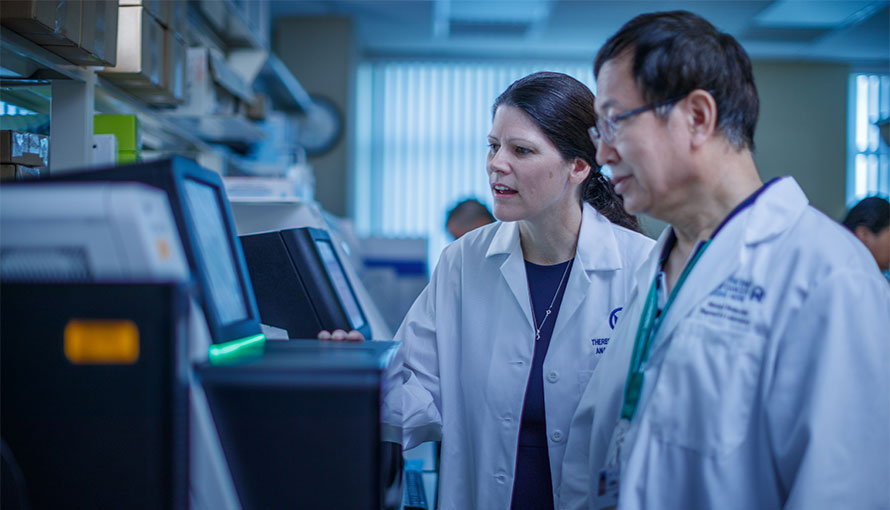Oncologic Molecular Pathology Fellowship

Program Description
The Molecular Pathology Fellowship Program offers a unique opportunity for the trainee to acquire practical experience in cutting edge technologies vital for a successful pursuit of an academic career in Oncologic Pathology. The Program Director, Dr. Theresa Boyle, is a molecular pathologist whose clinical work focuses on the development of solid tumor molecular analyses with interpretation and communication of molecular results to guide patient therapy. Her research work focuses on biomarkers of lung cancer. The Associate Program Director, Dr. Mohammad Hussaini, is a molecular pathologist whose work focuses on investigating, identifying, and assaying for molecular markers in acute leukemia and lymphoma, particularly with next-generation sequencing (NGS), to actualize the potential of personalized medicine in hematologic malignancies. Under the supervision and guidance of Dr. Boyle and Dr. Hussaini, the Fellow is provided with a foundation in molecular biology, experience with high-level diagnostics, and opportunities to pursue research projects with a variety of investigators covering a broad range of oncology specialties.
| Discovery and Development of Effective Approaches to Cancer Prevention, Diagnosis and Treatment | |
| Pillar of the Nation’s Cancer Research Effort | |
| Expediting State-of-the-Art Research Findings to Bedside Patient Care | |
| High-Volume Cancer Center | |
| Hospital for Cancer in Florida by U.S. News & World Report |
Moffitt Cancer Center is the only National Cancer Institute (NCI)-designated Comprehensive Cancer Center based in Florida. NCI-designated Comprehensive Cancer Centers are recognized for their scientific excellence. They are a major source of discovery and development of more effective approaches to cancer prevention, diagnosis and treatment. The NCI program is a pillar of the nation’s cancer research effort, and Florida aims to expedite state-of-the-art research findings to bedside patient care as quickly as possible. Moffitt Cancer Center's advanced diagnostic laboratories are state-of-the-art facilities located in Tampa near the University of South Florida. The laboratories are dedicated to the development and implementation of predictive, prognostic and diagnostic molecular biomarker testing that will permit the selection of cancer treatments with targeted therapy allowing for the best in personalized medicine.
Fellows receive training in the performance and interpretation of various molecular diagnostic tests, including pyrosequencing and NGS, to guide clinical decisions and targeted therapies. The Moffitt STAR™ (Solid Tumor Actionable Results) NGS assay allows the molecular laboratory to comprehensively analyze patient tumors with DNA and RNA based hybrid capture sequencing for numerous genetic changes in 170 genes efficiently in a single test using a relatively small amount of tissue. This important advancement enables the identification and screening of patients for eligibility to receive treatment with FDA-approved targeted therapy, such as FDA-approved therapies for lung cancers with EGFR, BRAF, ALK, ROS1, and NTRK genetic alterations, or to be considered for clinical trial enrollment. Many key actionable mutations only occur rarely, such as NTRK gene fusions, and there often is not enough tissue or assays available to test for these rare mutations one at a time. Moffitt STAR™ is essentially an “all in one” test that provides information about well-known clinically actionable changes and other genetic changes that might not be actionable immediately but could be helpful later. With this training, the Fellows acquire expertise in handling complex and time-sensitive patient material to inform the management of cancer patients. The fellow will actively participate in the review, interpretation and reporting of test results, test development and validation, QA/QC activities.
The volume (approximately 1,000 Moffitt STAR™ cases per year) and the variety of cases at Moffitt provide ample opportunity for Fellows to become competent in the field of Molecular Pathology. In-house rotations in Hematopathology, the Genomics Research Core, the Proteomics Research Core, the FISH laboratory, the Personalized Medicine Service, the CLIA Digital Imaging Laboratory and in Bioinformatics provide broad molecular pathology clinical and research experience. Integral to the curriculum is the experience with laboratory management, quality assurance, validation of new tests and techniques, as well as resource allocation and cost-effective practice. In addition, the fellow will attend didactic teaching sessions, educational (Grand Rounds) conferences, and participate in teaching rotations.
Research
Ample opportunity is given for participation in the development and validation of new molecular assays and to conduct research projects. The Fellow will receive mentorship, including in bioinformatics, for pursuing at least one research project with a hypothesis that is publication-worthy. The Fellow will maintain and utilize a database of Moffitt STAR™ NGS results in conjunction with a longstanding IRB-approved project to enable this research. Moffitt is the beneficiary of a P30 Cancer Center Support Grant (CCSG) which includes support for the Cancer Center Shared Resources and Services. These include Flow Cytometry, Molecular Genomics, Proteomics, Analytic Microscopy, Tissue Procurement, Biostatistics and Translational Research.
Fellows receive a competitive salary and comprehensive benefits package.
Faculty
Program Director
Theresa Boyle, MD, PhD, FCAP
Advanced Diagnostic Laboratories, ADL
Theresa.Boyle@moffitt.org
Associate Program Director
Mohammad Hussaini, MD
Mohammad.Hussaini@moffitt.org
Program Coordinator
Lorie Jennings
Graduate Medical Education Coordinator
Phone: 813-745-2250
Lorie.Jennings@moffitt.org
Oncologic Molecular Pathology
